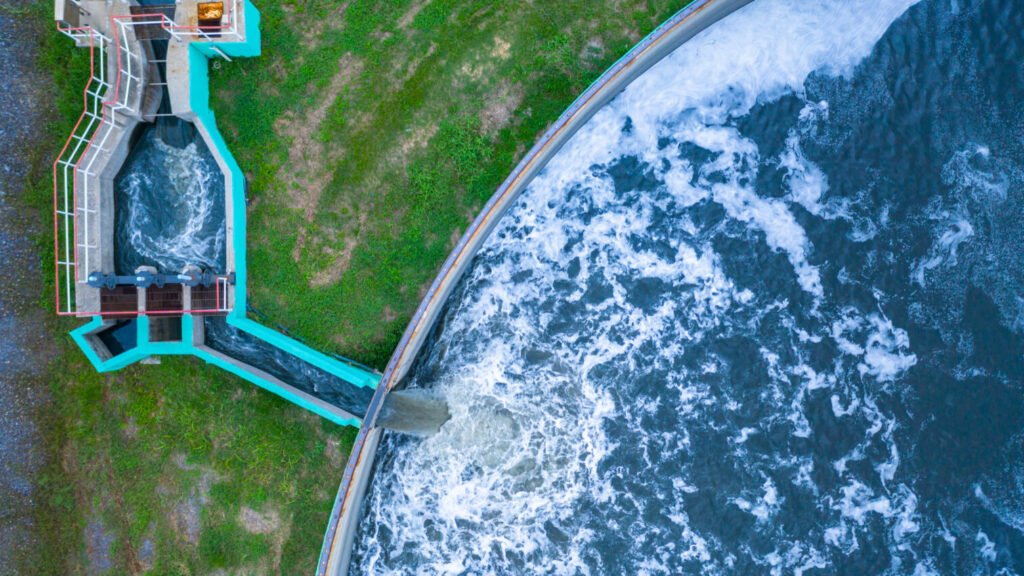Advancements in Wastewater Treatment: Screen Technologies and Grit Removal Innovations

n this episode, we engage with Simon Randle, who brings light to the latest advancements in wastewater treatment technologies. We delve into diverse solutions that are reshaping how wastewater is managed, from intricate screen technologies at the very beginning of the treatment process to advanced grit removal systems.
A Deep Dive into North Texas Municipal Water District’s (NTMWD) Environmental Commitment

The North Texas Municipal Water District (NTMWD) plays a pivotal role in the region’s water landscape, providing wholesale wastewater services to 24 communities and serving a substantial 1.4 million residents.
A Comprehensive Vision for Water Infrastructure Investment

As Texas stands on the brink of its 2024-2025 biennium with an impressive $32.7 billion surplus, a golden opportunity emerges to shape the state’s future through strategic investments in water, wastewater, and flood/stormwater projects.
Maximizing Efficiency in Wastewater Collection and Treatment

Orenco’s cutting-edge wastewater treatment systems are changing the game. In a candid conversation between Bill Snyder and Big Mike, we explore these innovative systems, diving into their functionality, applications, and the advantages they offer in terms of efficiency and cost savings.
Key Take Aways From EP11: “How Inflow and Infiltration Impacts Your Collection System and Wastewater Treatment Plant”

Inflow and Infiltration (I&I) is a critical factor that impacts wastewater collection systems and wastewater treatment plants. Simply put, I&I refers to stormwater and groundwater that unintentionally enters the sewer system. This usually happens via illegal connections, cross connections, foundation drains, roof drains, broken lines, unsealed manholes, or root infiltration.
Wastewater Engineering and Permitting

Wastewater Engineering and Permitting If you are a developer/property owner in a construction project, you must arrange for adequate storm and sanitary sewer services to the development site. The developer (property owner) will need to contact the appropriate wastewater engineer. The City and County of Denver’s Wastewater Engineering Department has final say over any new major development and redevelopment in the county. This includes development requiring a permit that results in the discharge of stormwater or wastewater, such as those resulting from the following: Sites and development of one-half acre or more Sanitary sewer lines Storm lines Drainage channels Water quality facilities The Wastewater Engineering and Permitting Division provides services to meet Denver’s current and future needs for safe and effective wastewater collection, transport and treatment. Applications for construction permits are processed as either minor construction or major construction through the combined efforts of Development Services and Denver Department of Transportation Construction Activities Stormwater Discharge Permit (CASDP) A Construction Activities Stormwater Discharge Permit (CASDP) is required for any project that meets the criteria listed below, or at the discretion of the DS Engineer. Stormwater Management Plans are required for development activities that include the disturbance of one acre or more; site development or redevelopment that is part of a larger plan; site development or redevelopment which has significant potential for erosion; or construction activities on soils contaminated by hazardous pollutants. The Construction Plan and Drainage Report or the Sanitary Sewer Study are required at the discretion of the Development Services engineer. This study must be done by a licensed professional engineer like Michael Groselle, P.E. from Modern Engineering Solutions, who will prepare a site plan to show the extent of work proposed; existing topographical contours, grades, and drainageways; proposed grades and profiles for roads, channels, and foundations; locations of existing drains and manholes; plans for structures (if any); proposed treatment facilities; proposed landscaping features such as curbs, sidewalks, fences (if any), etc… This guide helps the design professional consider and incorporate aesthetic elements at the earliest stages of designing a stormwater detention pond when an above-ground facility is chosen as a method to control stormwater runoff. It provides a process review, design considerations and tools to assist professionals in meeting their clients’ aesthetic needs while achieving technical requirements. Aesthetically enhanced detention and water quality ponds(PDF, 8MB) Step 1: Requirements for Submittal Storm Drainage Submittal and Sanitary Sewer Requirements Application to Construct (TEP Application)(PDF, 180KB) Attachment #1 – Engineers Certification Block(PDF, 13KB) Attachment #2 – Irrevocable Letter of Credit Sample(PDF, 118KB) Attachment #3 – Certificate of Inspection Letter Sample(PDF, 180KB) Attachment #4 – Title Block Sample(PDF, 362KB) Development Services Sanitary and Storm General Submittal Guidelines(PDF, 251KB) Easement Relinquishments Entrance Requirements(PDF, 586KB) Fees Sample Letter of Certification(PDF, 74KB) Sewer Main Build Over Requirements(PDF, 86KB) Sewer Main Line Abandonment Requirements(PDF, 88KB) Sample Permanent Non-Exclusive Easement (PNEE)(PDF, NOTE: Developments and Projects over 1 acre (both residential AND commercial) will also require a Construction Activities Stormwater Discharge Permit (CASDP) Step 2: Sewer Use and Drainage Permits (SUDP – Wastewater) See the Sewer Use and Drainage Permit page for complete information on Wastewater SUDP permits. Step 3: Standards and Details The following technical documents can be downloaded from the Department of Transportation & Infrastructure, Right of Way Services, Technical Documents page. Manuals and Regulations or Department of Transportation & Infrastructure Document Center. Sanitary design and technical criteria manual Sanitary sewer master plan Storm drainage design and technical criteria manual Storm drainage master plan Wastewater detail and technical specifications Wastewater standard detail drawings Step 4: Standard Fees For information on DOTI standard fees, see Department of Transportation and Infrastructure (DOTI) /SUDP under Building and Land Development Fees.
